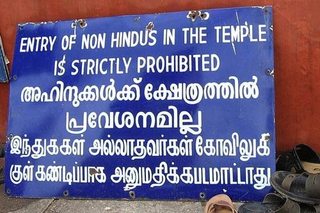
In India, non-Hindus from other communities can set up shops and other commercial activities inside the temple premises. However, in reality, the same cannot be said for religious places belonging to other communities. Hindus cannot set up any commercial activities by selling candles near Churches or set up shops near Mosques. Commercial activities in these places are reserved only for members of the respective communities.
In Tirupati, inside the temple premises, a number of Christians are employed by the Tirupati Temple Devasthanam board. These employees do not have a basic tenet or belief in the presiding deity of the temple, nor do they conform to practices. In addition, Christian religious beliefs on idolatry are directly in conflict with idol worship in Tirupati and other temples. Will this conflict not cause a bias and conflict of interest for these employees, when they have to facilitate Hindu religious activities in the temple? In such an organized plan by the Andhra Pradesh government to indoctrinate non-Hindus in Hindu temples, an act meant to stifle and destroy Hinduism? Though there is not much difference between Sanatan Dharma and Sikhism, Hindus (or any other community) entering Sikh Gurudwaras need to mandatorily cover their head.
In India, Hindu temples are directly under the supervision of the state governments. Why are such rules not applied to Hindu temples by the respective government? Hindus by and large are accommodative. Our traditions are vast like the ocean, and allow everyone who is sincere and devoted within their folds. In the Ananta Padmanabhaswamy temple in Trivandrum, Kerala, non-Hindus can enter the temple by signing a declaration of faith in the presiding deity of the temple. In addition, Dhoti and Angavastram for men, and Saree, Pavadai for women are mandated as a dress code for temple entry.
Though there can be no in-principle objections to non-Hindus entering Hindu temples, will the state governments that supervise temples across India apply rules requiring Dhoti, Panchagavyam for men, and Saree, or Pavadai for women, along with the declaration of faith on the presiding deity of the temple for entry?